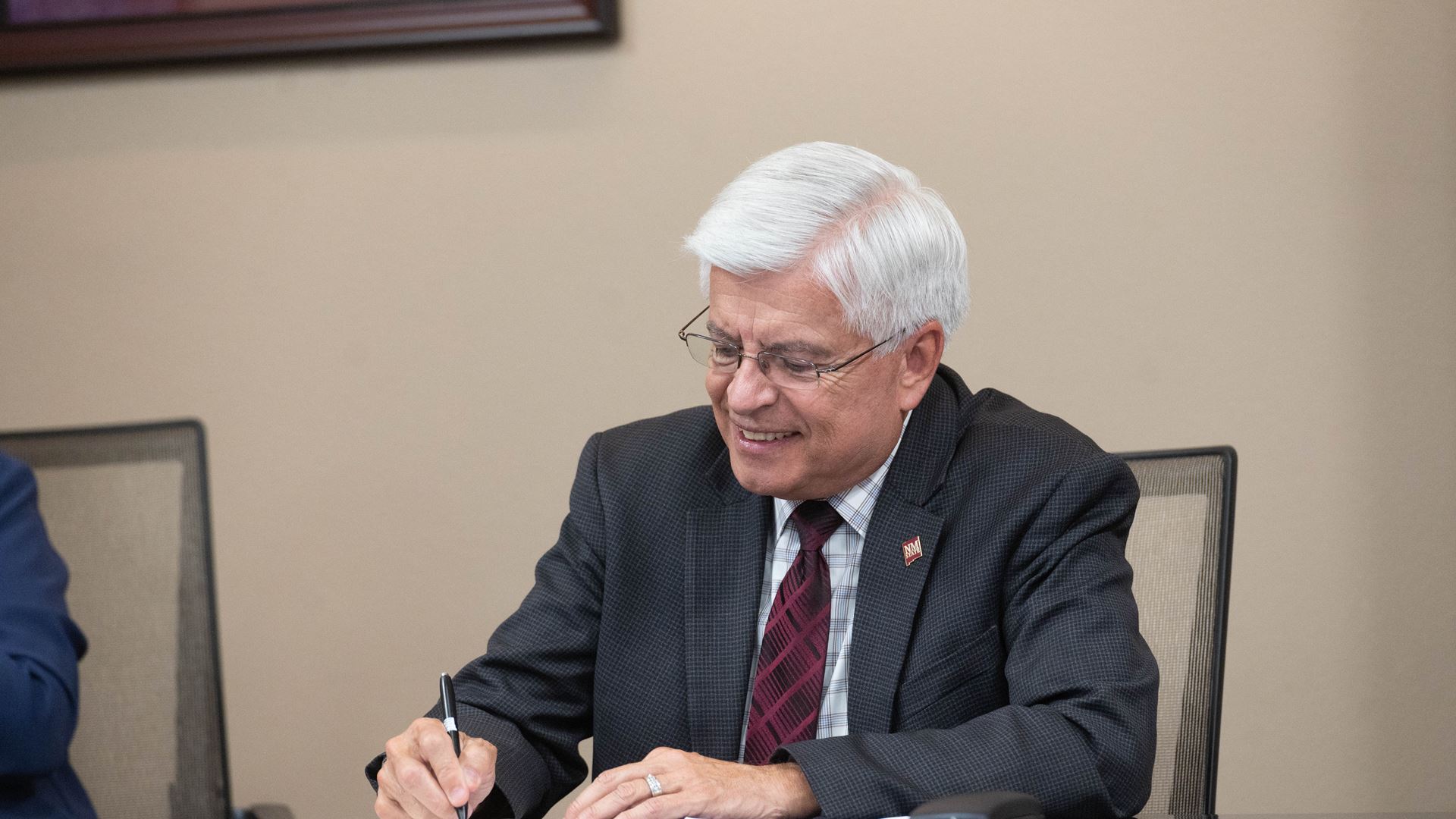New Mexico State University has joined forces with the University of Texas at San Antonio and the United States Fish and Wildlife Service to create a national consortium to help advance underrepresented students pursuing careers in the natural resources.
The two universities entered into a formal agreement with the federal agency during a virtual signing ceremony on April 11.
The event brought together dignitaries from NMSU, UTSA and the U.S. Fish and Wildlife Service, including Martha Williams, the new U.S. Fish and Wildlife Service director. NMSU Chancellor Dan Arvizu, interim Provost Dorothy Campbell, Rolando A. Flores Galarza, dean of the College of Agricultural, Consumer and Environmental Sciences, and others from NMSU participated in the ceremony.
“We are thrilled to enter into this unique partnership that will provide a platform to recruit students from diverse backgrounds into conservation career opportunities within the U.S. Fish and Wildlife Service,” Williams said. “The future success of the service hinges on recruiting, welcoming, and empowering bright, driven professionals from diverse backgrounds who can help us find effective approaches and innovative solutions to meet the conservation challenges of today and the future.”
The agreement sets the stage for the two institutions to work with the U.S. Fish and Wildlife Service to increase workplace diversity in the natural resources and environmental sciences fields through collaborations.
“As a Hispanic-serving institution and land-grant institution, NMSU is proud of the important role we play in training and educating students from diverse backgrounds to broadly enter the natural resource workforce and specifically with the U.S. Fish and Wildlife Service,” Arvizu said. “We also take seriously the collaborative role of our faculty and graduate students working with U.S. Fish and Wildlife Service biologists to research and understand topics of conservation and management concern. The signing of this document ensures our relationship will continue and strengthen in the future.”
Martha Desmond, NMSU Regents professor who spent the past year working with UTSA and the U.S. Fish and Wildlife Service to develop the agreement framework, called the consortium “historic.”
“This is the first time anyone has entered into a national agreement with one of the federal agencies, specifically aimed at workforce diversity,” Desmond said.
NMSU and UTSA will serve as ambassadors for the consortium and take the lead in developing programs and initiatives to meet the project’s goals and mission.
Desmond said the consortium seeks to create a one-stop recruitment source for underrepresented students to excel within the U.S. Fish and Wildlife Service. This will involve preparing students for competitive professional careers within the agency and building a lasting partnership between research-focused Hispanic-serving institutions, historically Black colleges and universities, tribal colleges and universities, and the U.S. Fish and Wildlife Service.
NMSU and UTSA will also create peer-to-peer mentoring and experiential networks to support students, faculty and early career professionals at the U.S. Fish and Wildlife Service.
“The signing and actualization of the intent of this memorandum of understanding between these educational institutions and the U.S. Fish and Wildlife Service is a significant step in advancing more diversity in natural resources and environmental sciences careers,” said Benjamin N. Tuggle, a former director of the U.S. Fish and Wildlife Service’s Southwest Region.
Tuggle added: “The subsequent actions of the partnership and the development of the relationships will play a pivotal role, over time, in developing a new generation of highly trained minority students that government, educational institutions and industry can enlist.”
Consortium will begin with UTSA and NMSU, but others institutions have expressed interest in joining, including Fort Valley State and Tuskegee University.
“As the consortium progresses, this number of partner institutions will continue to grow, incorporating HBCUs, TCUs and HSIs across the South and Southwest,” Desmond said.
Many of the students expected to benefit from the consortium will come from NMSU’s Department of Fish, Wildlife and Conservation Ecology, said Matthew Gompper, who heads the department.
“Out department is well recognized as a premier program in the Southwest, and the diversity of our student body strongly reflects that of the state of New Mexico,” Gompper said. “It is no surprise that federal agencies such as the U.S. Fish and Wildlife Service would seek to partner with us as they focus simultaneously on enhancing their workforce diversity and on recruiting the very best new employees.”
Gompper added that the consortium will also act as a model for similar programs with other agencies.
“Our students are top-tier,” he said. “Agreements such as the one signed today with the U.S. Fish and Wildlife Service will help ensure that the very best students have clear pathways to help guide agencies that deal with natural resource conservation and management.”
Desmond said NMSU has a long history of working with the U.S. Fish and Wildlife Service, making it uniquely positioned to take a leading role in shaping the consortium. Moreover, both NMSU and UTSA have long-term records of training and mentoring underrepresented minority students into internships and fellowships with the U.S. Fish and Wildlife Service.
Over next three to five years, the consortium will begin to see results, Desmond said. The desired outcomes include increasing student exposure to research and career opportunities at the U.S. Fish and Wildlife Service; mentoring and training students for career-track placement with the agency; and developing programming to support the placement of students in positions with the potential to become research and policy leaders.
“The College of Agricultural, Consumer and Environmental Sciences has a strong track record in the natural resource sciences and preparing and connecting our students with workforce opportunities,” Flores Galarza said. “This historic memorandum of understanding signing with the U.S. Fish and Wildlife Service is evidence of this strength and the quality of our Fish, Wildlife and Conservation Ecology program.”

